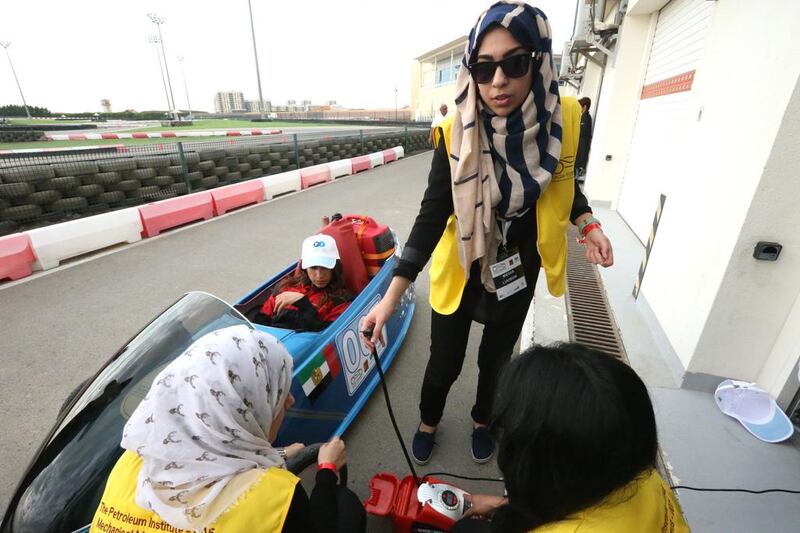Abu Dhabi // The UAE is famed as a host of international motor races – but the latest event does not champion the need for speed.
For once, the fastest car will not be the winner – it will be the one that travels farthest using the least fuel.
More than 100 students from across the GCC arrived in the capital on Thursday for the Taqa GCC Hybrid-Electric Challenge.
The teams competing in Friday’s main race were given only a basic kit and a few months to build a hybrid, one-seater vehicle.
They must use their own knowledge to ensure maximum fuel efficiency along the course, at Al Forsan in Khalifa City.
“We were very excited and wanted to be involved when we heard about it a semester ago,” said Hajar Rabie, 20, who is representing one of the three Petroleum Institute teams in the competition.
“Our main goal in the beginning was to just set the car up and get it running. It runs on electricity and we have the option of adding a fuel generator so we don’t have to stop and power the battery.”
During the heats, the cars were only allowed to run on their battery power and will begin the race on Friday using their remaining power.
Each car is allowed just 1.5 kilowatt hours of electrical energy and 3.8 litres of petrol.
“It all depends on how you fix the car together – if everything fits perfectly and is snug then you increase the efficiency,” Ms Rabie said. “We have taken it apart and put it back together a lot of times to improve the efficiency.”
Ms Rabie’s all-female team, the Mechanical Maestros, is aiming high.
“We had a battle to decide who would drive the car, but everyone who wanted to race had to test drive and we chose the best drivers to make sure we win. We are 100 per cent confident,” she said.
“It is not about speed – the main job is to keep the car running and make sure it runs efficiently.
“Using the brakes wastes energy, so we had to develop a strategy without much braking.
Sharouk Mohamed, 19, is part of a female team from Qatar.
“I am an industrial engineering student and this is the first time I’ve been involved in a competition like this,” she said.
“As engineers we are problem-solvers and care about the environment and sustainability. This hybrid car is a great idea to help the environment in future.
“It has been a lot of work. Every part of this car we have fitted ourselves.
“I started out as a safety officer but now I am a driver. At the beginning I was so nervous to drive it, but once you feel the air blowing past you it is so fun and so interesting.”
The event offers important environmental lessons for the team.
“The energy crisis that is facing all of us is here and world consumption of energy is growing exponentially, so everyone who is concerned about this knows the solution is to find new sources of energy,” said Dr Sami Ainane, a professor at the Petroleum Institute and organiser of the event.
“Eventually we will run out of oil, so we also have to be more efficient with the resources we have.
“My thinking was, let me take this group of future engineers and instil in them the idea that whatever they design, efficiency is the most important thing.
“It is very exciting and I am hoping next year there will be 10 times more teams – I’m sure many people hearing about this want to be involved.
“This is a wonderful vehicle for education and for bringing awareness to efficiency. Even if they don’t realise it, they are all learning.”
The students formed 11 teams. Three teams are from the Petroleum Institute, along with competitors from Abu Dhabi University, UAE University, Khalifa University, the Masdar Institute, Oman’s Nizwa College of Technology, Kuwait’s College of Technological Studies, and two teams from Qatar University.
The winner will be decided on Friday after a three-hour race.
The event has been organised and supported by Taqa, the Petroleum Institute, Global Education Energy Environment and the Emirates Foundation for Youth Development.
ksinclair@thenational.ae





